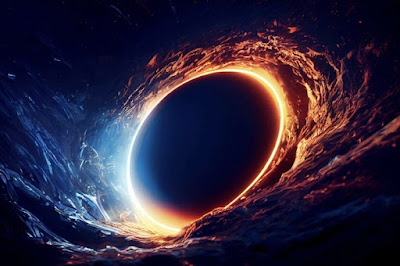A ring wormhole is one that you could simply step through, like a portal through space – but new, more detailed models have shown that they could be a portal through time as well
 |
| A ring wormhole might be a time portal |
Ring wormholes, first proposed in 2016, are made up of a string of exotic matter with negative energy – a property that is possible due to quantum effects, but only, as far as we know, in extremely small amounts. Because of the way this exotic matter would warp space-time, a circle made of one of these strings would act as a sort of portal to another area of space-time.
“You could go through and not even notice that you went to another universe,” says Andrei Zelnikov at the University of Alberta in Canada.
Zelnikov and his colleagues calculated that such a wormhole could actually allow you to travel through time as well. If the entrance of the wormhole were placed in a higher gravitational field than the exit – meaning one is near lots of matter and the other is not – the two sides of the wormhole would experience the passage of time at a different rate. This is due to a known effect of general relativity called gravitational time dilation.
That means that if you passed through the wormhole and then came back, you would effectively travel through time. “The time machine is a natural consequence of the wormhole existing,” says Toby Wiseman at Imperial College London. “Apart from the crazy matter that makes up the wormhole, there’s nothing too wild being postulated here, and then the consequence is something even more crazy.”
This wouldn’t allow unlimited time travel, says Zelnikov. You would never be able to travel back in time to before the wormhole became a time machine. “Mathematically you can go to the past, and your older self and younger self meet,” he says. “There are many logical paradox problems, but mathematically there are no contradictions.”
Practical issues are another story entirely. “I doubt there is any way to make such a string with known matter fields, so probably this is not a physically possible situation,” says Aron Wall at Cambridge University. “But we can still ask what would happen.”
Then there is another issue: some prior work has suggested that once anything that would allow you to travel back in time like this has formed, quantum effects would immediately obliterate it.
“It may be impossible, if you take into account quantum effects, but nobody knows how to take into account quantum effects in space-time,” says Zelnikov. “If [ring wormholes] don’t exist, it could be because quantum effects made them blow up.”
Even if that is the case, studying systems like this could help us understand how those quantum effects work. Wiseman says that because a ring wormhole is a relatively “very simple construction” – compared with a more traditional tunnel-like wormhole – studying them might help us understand why time travel seems to be off-limits in our universe.
They could also help us understand the very early universe, when our own space-time may have been crunched down into a similarly unintuitive shape, he says.
Journal reference:
Physical Review DDOI: 10.1103/PhysRevD.108.024034








0 Comments